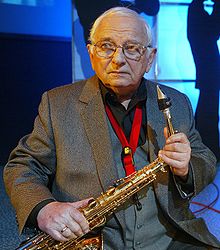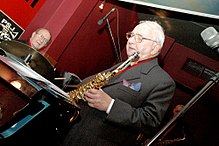| Revision as of 12:52, 3 August 2021 editGerda Arendt (talk | contribs)Autopatrolled, Extended confirmed users, File movers, Pending changes reviewers, Rollbackers382,433 editsmNo edit summary← Previous edit | Revision as of 13:13, 3 August 2021 edit undoGerda Arendt (talk | contribs)Autopatrolled, Extended confirmed users, File movers, Pending changes reviewers, Rollbackers382,433 edits other refNext edit → | ||
| Line 27: | Line 27: | ||
| == Life and career == | == Life and career == | ||
| Matuszkiewicz was born in ] and began playing jazz as a youth. He founded a jazz club at the ] in ] at age 20.<ref name="Polandin" /> He studied at the ]. |
Matuszkiewicz was born in ] and began playing jazz as a youth. He founded a jazz club at the ] in ] at age 20.<ref name="Polandin" /> He studied at the ].<ref name="Culture" /> | ||
| A club ] (Music enthusiasts) was founded in 1947, at the Łódź YMCA, a hang-out of nonconformist thinkers during the late 1940's.<ref name="Culture" /> Musicians of the first years included Marek Szczerbiński-Sart, trumpeter {{ill|Andrzej Wojciechowski|pl|Andrzej Wojciechowski (muzyk)|lt=Andrzej "Idon" Wojciechowski}}, drummer {{ill|Witold Sobociński|pl|lt=Witold "Dentox" Sobociński}}, and Marian and {{ill|Tadeusz Suchocki|pl}}.<ref name="Gradowski" /> In 1950 the club was closed, but Matuzkiewicz founded and lead a band called Melomani, also playing saxophones and clarinet, with the former players, and pianists ] and ], and bassist Witold Kujawski. Polish musicians were separated from developments of Western jazz,<ref name="Culture" /> because the Stalinist regime considered jazz music as part of decadent American culture.<ref name="Polandin" /> The musicians had no recordings and publications, therefore they played a repertoire that did not compare to Western standards. Critic Elliott Simon noted: {{quote|Melomani played a series of standards with enthusiasm exceeded only by their fans' obvious adoration ... it is however, the historical circumstance - when Jazz was a high energy outlet for the creativity of a culturally repressed society."<ref name="Culture" />}} | |||
| ] | ] | ||
| Line 38: | Line 40: | ||
| {{reflist | {{reflist | ||
| | refs = | | refs = | ||
| <ref name="Gradowski">{{cite web | |||
| | last = Gradowski | |||
| | first = Mariusz | |||
| | url = https://culture.pl/en/tworca/melomani | |||
| | title = Melomani | |||
| | website = culture.pl | |||
| | date = December 2011 | |||
| | access-date = 3 August 2021 | |||
| }}</ref> | |||
| <ref name="Culture">{{cite web | <ref name="Culture">{{cite web | ||
| Line 46: | Line 58: | ||
| | access-date = 3 August 2021 | | access-date = 3 August 2021 | ||
| }}</ref> | }}</ref> | ||
| https://culture.pl/en/tworca/melomani | |||
| <ref name="Filmpolski">{{cite web | <ref name="Filmpolski">{{cite web | ||
Revision as of 13:13, 3 August 2021
Polish jazz musician and composer
| Jerzy Matuszkiewicz | |
|---|---|
 Matuszkiewicz in 2006 Matuszkiewicz in 2006 | |
| Born | (1928-04-10)10 April 1928 Jasło, Poland |
| Died | 31 July 2021(2021-07-31) (aged 93) Warsaw, Poland |
| Education | Łódź Film School |
| Occupations |
|
| Organizations | Melomani |
| Awards | |
Jerzy "Dudus" Matuszkiewicz (Polish pronunciation: [ˈjɛʐɨ matuʂˈkʲɛvit͡ʂ]; 10 April 1928 – 31 July 2021) was a Polish jazz musician and composer, playing saxophone, clarinet and piano. Between 1950 and 1958, he was leader of the jazz group Melomani. From 1965, he focused on composing music for films. He was a pioneer of the post-World War II jazz movement in Poland, regarded as a "Founding Father" of Polish jazz".
Life and career
Matuszkiewicz was born in Jasło and began playing jazz as a youth. He founded a jazz club at the YMCA in Kraków at age 20. He studied at the Łódź Film School.
A club Melomani (Music enthusiasts) was founded in 1947, at the Łódź YMCA, a hang-out of nonconformist thinkers during the late 1940's. Musicians of the first years included Marek Szczerbiński-Sart, trumpeter Andrzej "Idon" Wojciechowski, drummer Witold "Dentox" Sobociński, and Marian and Tadeusz Suchocki [pl]. In 1950 the club was closed, but Matuzkiewicz founded and lead a band called Melomani, also playing saxophones and clarinet, with the former players, and pianists Andrzej Trzaskowski and Krzysztof Komeda, and bassist Witold Kujawski. Polish musicians were separated from developments of Western jazz, because the Stalinist regime considered jazz music as part of decadent American culture. The musicians had no recordings and publications, therefore they played a repertoire that did not compare to Western standards. Critic Elliott Simon noted:
Melomani played a series of standards with enthusiasm exceeded only by their fans' obvious adoration ... it is however, the historical circumstance - when Jazz was a high energy outlet for the creativity of a culturally repressed society."

Between 1950 and 1958, Matuszkiewicz was leader of Melomani. Until 1964, he performed both in Poland and abroad. In 1965, he began to mainly produce music for movies and commercials. He later resided in Warsaw with his wife, Grażyna, where he died, aged 93.
Awards
Matuszkiewicz received the Commander's Cross of the Order of Polonia Restituta for outstanding achievements. In 2006, he was awarded the Gold Helikon medal from the Krakow Jazz Club. In 2021, he received an award for his life achievements at the Polish Film Awards gala.
References
- ^ "Polish Jazz – Freedom at Last / The Story of Polish Jazz". culture.pl. 19 January 2009. Retrieved 3 August 2021.
- ^ "Polish jazz pioneer passes away aged 93". polandin.com. 31 July 2021. Retrieved 2 August 2021.
- Gradowski, Mariusz (December 2011). "Melomani". culture.pl. Retrieved 3 August 2021.
- "Jerzy Matuszkiewicz". filmpolski.pl (in Polish). Retrieved 3 August 2021.
- "Jerzy "Duduś" Matuszkiewicz nie żyje. Legendarny jazzman i kompozytor miał 93 lata". kultura.gazeta.pl (in Polish). 31 July 2021. Retrieved 3 August 2021.
External links
- Jerzy Matuszkiewicz discography at Discogs
- Jerzy Matuszkiewicz at IMDb
- Kałużna, Ewa: Jerzy „Duduś” Matuszkiewicz (in Polish, biography, photos and videos) muzeumjazzu.pl 2020